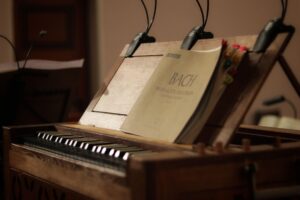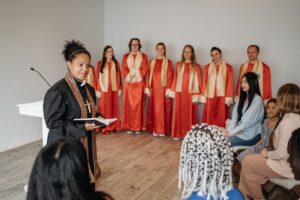Religious Themes in Music

These days you’d need some infusion of hope and joy. Lent at Ephesus (EWTN, last Sunday) was just what the spiritual doctor ordered. We followed the Benedictines of Mary, Queen of Apostles from the USA as they recorded a Lenten CD of their tranquil chants and hymns. One observer reckoned they sang more than they talked! There was a regularity to their daily routine of prayer, chant, work and modest meals, but the music was central. Mother Cecilia spoke of her music education and how she played in an orchestra for a few years after graduating. She had a house and a car but all along felt God’s call to religious life, and eventually found peace in following that vocation.
Kevin and Monica Fitzgibbon of De Montfort Music heard their singing and worked with them to produce the Lent at Ephesus CD (available on Spotify). The tracks played in the background during the programme, though I would have liked better synchronisation with footage of the sisters singing. This wouldn’t be my own favourite kind of music, but I was particularly drawn to ‘God of Mercy and Compassion’ and ‘O Sacred Head Surrounded’ with Bach’s familiar melody (also borrowed by Paul Simon for ‘American Tune’).
I was struck by the age profile of the sisters – most were young and it seemed quite a large community. I’d love to have heard vocation stories from more of the sisters. Mother Cecilia was glad to be able to ‘share the beauty of sacred music’ and prayed it will help many to love God all the more.
Theological Reflections on the Role of Music in Worship
Music and song continue to play a vital role in the life of God’s people today. Contemporary culture and modern technology bring new possibilities and new challenges to the music ministry of the church. People’s lives are surrounded with music—television and radio, the background music of video games, the muzak of shopping malls, CDs, and synthesizers. Yet much of the time music functions as “background” rather than as an opportunity for serious listening, much less participation. Outside the church there are few occasions or opportunities in North American culture for people to sing together. Much of the popular music (including popular Christian music) composed today is for performance rather than for participation.
The church also has greater access and has shown greater openness to a greater variety of music—from classical hymnody to Christian rock, from European cantatas to South African choruses. Such diversity is to be welcomed and celebrated; it reflects the diversity and richness of God’s creation. But greater variety and options in music call for greater discernment and care in planning and implementing the music ministry of the church. The people of God sing; what they sing and how they sing are important issues.
1. Music is a gift of God and part of the created order.
From its inception, “when the morning stars sang together and all the heavenly beings shouted for joy” (Job 38:7), to its consummation, when “every creature in heaven and on earth and under the earth and in the sea, and all that is in them” will sing to the Lamb on the throne (Rev. 5:13), creation is musical. “All nature sings and round me rings the music of the spheres.” Human music-making participates in the music of creation and reflects the order, beauty, and diversity of God’s creation.
2. Of all the musical instruments that may be employed in the praise of God, the human voice has priority.
Other instruments are to be used primarily in the service of the singing of God’s people.
Reformed theologian Karl Barth points out that singing is not an option for the people of God; it is one of the essential ministries of the church:
“The Christian church sings. It is not a choral society. Its singing is not a concert. But from inner, material necessity it sings. Singing is the highest form of human expression….What we can and must say quite confidently is that the church which does not sing is not the church. And where…it does not really sing but sighs and mumbles spasmodically, shamefacedly and with an ill grace, it can be at best only a troubled community which is not sure of its cause and of whose ministry and witness there can be no great expectation….The praise of God which finds its concrete culmination in the singing of the community is one of the indispensable forms of the ministry of the church.”
3. Singing is a ministry that belongs to all the people of God.
The congregation is always the primary choir. The role of professional or volunteer choirs and musicians is to aid the whole people of God in their worship. While anthems or vocal and instrumental solos may be offered, they do not have to be. Congregational singing, however, is essential. While it is possible to be actively engaged in worship and in prayer while listening to an anthem or solo, a diet of worship which does not regularly include ample opportunity for all the members of the congregation to join in song will be impoverished worship, and the life of the church and the faith of its people will suffer.
4. Of all the art forms that may be employed in worship, singing is especially corporate.
Indeed, it is the art form most suited to expressing the church’s unity in the body of Christ. Different voices, different instruments, different parts are blended to offer a single, living, and unified work of beauty. John Calvin recognized the power of congregational singing and unison prayer in helping the church express and experience the unity of the body of Christ. Asserting that the human tongue was especially created to proclaim the praise of God, both through singing and speaking, he noted that “the chief use of the tongue is in public prayers, which are offered in the assembly of the believers, by which it comes about that with one common voice, and as it were, with the same mouth, we all glorify God together, worshiping him with one spirit and the same faith” (Institutes of the Christian Religion).
5. The church’s ministry of song is for the glory of God.
The principal direction of congregational singing is to the Lord (Ps. 96:1). Music is made first of all to the Lord and only secondarily to each other. Music should communicate and express a sense of awe and wonder in the presence of God; it should lead our thoughts toward God rather than toward ourselves.
God can be glorified by beautiful sounds and spirits may be uplifted by a pleasing melody, but it is primarily the joining of the tune to a text that gives meaning to Christians’ songs. Not only should both text and tune glorify God and be consistent with each other, but the tune must serve the text. Music is always the servant of the Word.5 Calvin cautioned that “we should be very careful that our ears be not more attentive to the melody than our minds to the spiritual meaning of the words….[S]uch songs as have been composed only for the sweetness and delight of the ear are unbecoming to the majesty of the church and cannot but displease God in the highest degree.”
6. The church’s ministry of song is for the edification of God’s people.
Through congregational singing Christian faith is not only expressed; to a very real degree it is formed. Since people tend to remember the theology they sing more than the theology that is preached, a congregation’s repertoire of hymnody is often of critical importance in shaping the faith of its people. Here again, it is the meaning of the text that is of primary importance. It is through the sense of the words that God’s people learn of the nature and character of God and of the Christian life. Noting that if one prays in a tongue, the “spirit prays,” but the “mind is unfruitful,” the Apostle Paul vows, “I will sing with the spirit and I will sing with the mind also” (1 Cor. 14:14-15, RSV).
Christian hymnody contains some of the most tightly packed, concise doctrinal and devotional thought of the church. Through congregational song God’s people learn their language about God; God’s people learn how to speak with God. Songs of worship shape faith. It is, therefore, very important that a congregation have a rich “vocabulary of praise.” Simple, repetitive music such as praise choruses and Taize chants are very appropriate in worship and can be very effective in moving individuals to prayer and to praise. But it is also important for the congregation to know some of the great hymns of faith in order to have a sense that the Christian faith is both relevant and enduring, and to be enriched by the faith of the “great cloud of witnesses.” Hymns, both ancient and modern, which stretch minds, increase vocabulary, rehearse the biblical story, and teach of the nature and the mighty acts of God are essential for the congregation’s growth in faith.





